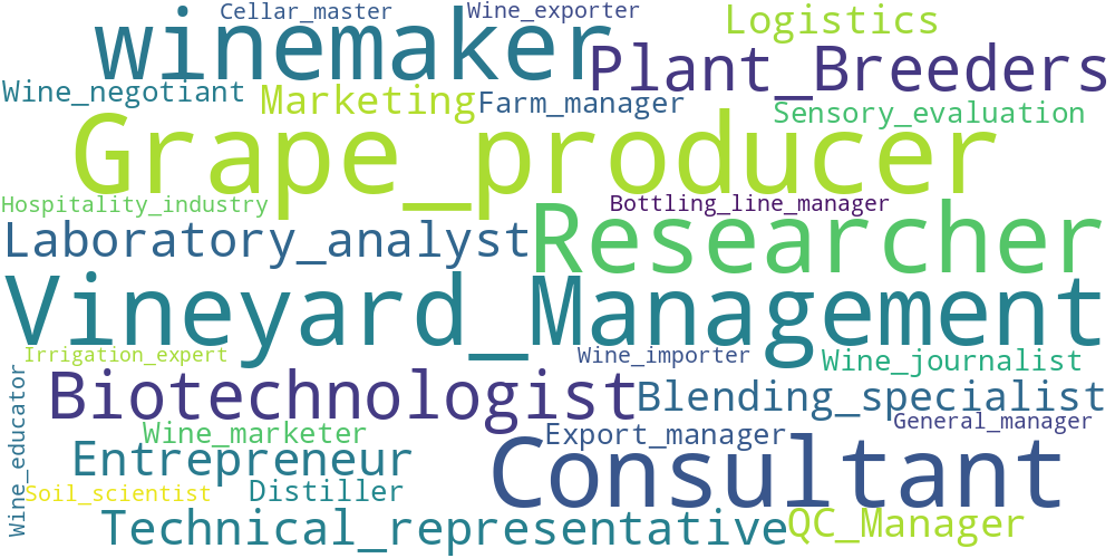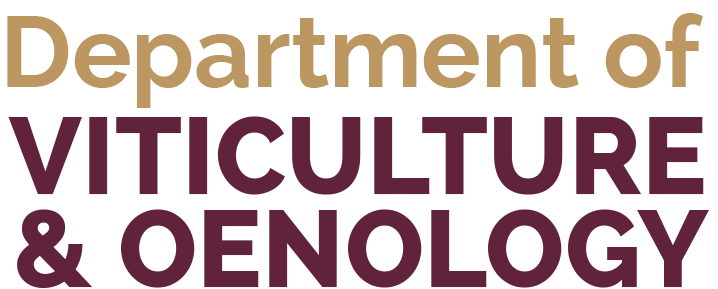The four-year Bachelor of Science in Agriculture (BScAgric) programme in Grape and Wine Sciences provides a comprehensive foundation for careers in the grape and wine industries. The curriculum explores the structure and function of the vine, emphasizing the scientific management of the plant to produce sustainable, environmentally harmonious grape products suitable for crafting distinctive wines. In addition, the programme integrates in-depth knowledge of the chemical and biological processes underpinning the production of wine and brandy, with a focus on preserving natural resources. Graduates are equipped with the theoretical and practical expertise needed to contribute meaningfully to the viticulture and oenology sectors.
Modules
BScAgric Viticulture and Oenology (General)
| Module Name | Module Code | Credits | Module Description | Teaching Load |
| 14052 Crop Production | 152 | 8 | 1.5L, 1.5P | |
| 13872 Grapevine Sciences | 214 | 12 | 2L, 3P | |
| 13872 Grapevine Sciences | 244 | 16 | 3L, 3P | |
| 13872 Grapevine Sciences | 452 | 8 | 2L, 3P | |
| 13710 Grapevine and Wine Sciences | 142 | 8 | 1.5L, 1.5P | |
| 13710 Grapevine and Wine Sciences | 212 | 8 | 1.5L, 1.5P | |
| 13710 Grapevine and Wine Sciences | 278 | 8 | 2L, 2P | |
| 13710 Grapevine and Wine Sciences | 378 | 8 | 2L, 2P | |
| 13710 Grapevine and Wine Sciences | 444 | 8 | 2L, 3P | |
| 13710 Grapevine and Wine Sciences | 454 | 8 | 2L, 3P | |
| 13710 Grapevine and Wine Sciences | 478 | 60 | 3T, 3P | |
| 13890 Wine Sciences | 214 | 16 | 3L, 3P | |
| 13890 Wine Sciences | 244 | 16 | 3L, 3P | |
| 13890 Wine Sciences | 314 | 16 | 3L, 3P | |
| 13890 Wine Sciences | 344 | 16 | 3L, 3P | |
| 13890 Wine Sciences | 446 | 24 | 3L, 3T, 3P |
Industry Training
Students enrolled in the BScAgric programme with majors in Viticulture and Oenology are required to complete compulsory practical training in both disciplines. This hands-on experience typically takes place from the end of the third year through the middle of the fourth year, and includes vineyard-based activities such as winter pruning and summer canopy management, as well as work in a commercial wine cellar.
Note that this qualification is internationally recognized. Graduates may pursue the following career opportunities, among others.

Extended Degree Programme
The Extended Degree Programme (EDP) was introduced to assist students with proven potential but without adequate schooling in mastering their degree programmes. An additional year of study is added to a mainstream degree programme to form an EDP. This extra year is utilised to prepare students, by means of additional academic support, for specific mainstream subjects and for university studies in general.
Any student who is admitted to a mainstream programme may apply for admission to the relevant EDP. Based on school results and/or the results of any assessment or test, including the NBTs, prescribed by the University, a student may be advised or compelled by the Faculty to follow the EDP route.
The minimum admission requirements for the EDP in the programmes are set out in the Selection guidelines and admission policy for undergraduate programmes for the Faculty of AgriSciences. For full detail, visit: https://agric.sun.ac.za/undergraduate/
Bursaries
Please contact the Bursary and Loans office or see the annual year book for bursaries. Please take note of closing dates for bursaries.
Admission Requirements
For university admission, a prospective student is required to be in possession of a National Senior Certificate (NSC) or school-leaving certificate from the Independent Examination Board (IEB) as certified by Umalusi, with admission to bachelor’s degree studies (which requires a performance level of at least 4 (50-59%) in each of four designated university admission subjects), or an exemption certificate issued by the South African Matriculation Board to students with other school qualifications
In addition to the above, admission to programmes leading to BScAgric require at minimum:
- An average performance level of 60% in the NSC or the IEB’s school-leaving certificate (excluding Life Orientation), or other school qualification
- Afrikaans or English (Home Language) 4 (50%)
- Mathematics 5 (60%)
- Physical Sciences 4 (50%)
The prospective student is also required to take the National Benchmark Tests (NBT), including the mathematics component (MAT) of the tests.
Application Procedure
Information on the application procedure can be found at https://www.su.ac.za/en/apply/undergrad
Foreign students: Please apply online via the International Office where you will find all the relevant information on the application procedures, visa requirements, fees and accommodation.

